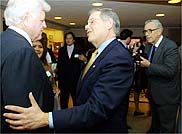|
Esta página no está disponible en español.
THE NEW YORK TIMES
Latino Groups Seek a Top Democratic House Post
By RAYMOND HERNANDEZ
March 9, 2002
Copyright © 2002 THE NEW YORK TIMES. All Rights Reserved.
 ---------- ----------
Leading Hispanic groups back Representative Robert Menendez of New Jersey, center, with Senator Edward M. Kennedy of Massachusetts, for Democratic caucus chairman, the party's third-highest post in the House.
[PHOTO: Susana Raab for The New York Times]
----------
WASHINGTON – The nation's most prominent Hispanic organizations are trying to turn a relatively obscure Congressional leadership race into a test of the Democratic Party's commitment to them.
The groups are backing Representative Robert Menendez, a leading Hispanic lawmaker from New Jersey, for caucus chairman, the third-highest position among House Democrats.
With the vote of the caucus still eight months away, the groups have made clear that they see it as an opportunity for Democrats to demonstrate their commitment to advancing Hispanics within the party.
They are using the race, between Mr. Menendez and Representative Rosa DeLauro of Connecticut, as an occasion to warn Democrats not to take them for granted, particularly now that Hispanics are seen as a crucial voting bloc. Prominent Republicans, among them President Bush and Gov. George E. Pataki of New York, have aggressively courted Hispanic voters in an effort to expand their own electoral base, at the expense of the Democrats.
Jose H. Villarreal, chairman of the National Council of La Raza, a Latino civil rights group, said it would be a mistake to view the Menendez- DeLauro race as just an internal House matter, as some have characterized it. "This offers a historic opportunity for Democrats to signal to Latinos that they are being taken seriously," Mr. Villarreal said.
Dennis Rivera, a union leader from New York whose membership is heavily Latino, agreed, warning that a Menendez defeat would send a troubling message to Hispanics.
"There is an increasing sentiment among us Latino Democrats that the Democratic Party is taking us for granted," he said. "This race is an opportunity for the Democratic Party to show that its commitment to Latinos is more than just words."
Mr. Menendez is vice chairman of the caucus, the only Hispanic in either party to hold a Congressional leadership post that high. But because of term limits in the House seniority system, he must abandon his position at the end of the year.
The groups supporting Mr. Menendez run a risk: they could provoke a backlash if rank-and-file Democratic lawmakers perceive them as meddling in internal House workings. One senior aide to the Democratic Congressional leadership criticized the lobbying effort.
"There are those who are trying to create an issue here," the aide said dismissively. "There are people who are trying to make this a cause célèbre of the Hispanic community."
But backers of Mr. Menendez point to the gender politics that they say played a role in Representative Nancy Pelosi's recent elevation to House Democratic whip, the highest post any woman has held in either house of Congress. Now, Latino leaders are saying in effect, their time has come.
"I believe it means as much for Latinos to see Mr. Menendez in a leadership role in the party as it did for women to see Ms. Pelosi rise to a leadership role," said Arturo Vargas, executive director of the National Association of Latino Elected and Appointed Officials.
Ms. DeLauro says she has broad House support that cuts across ideological, ethnic and racial lines. Her campaign, she says, is based on neither her Italian-American ethnicity nor her gender.
Further, "I am not going outside the institution to collect support," she said, suggesting that Hispanic organizations were making a mistake by trying to influence a contest within the House. "Members don't respond to being pressured by outside groups," she said.
Mr. Menendez said he too was running a campaign based on broad support among House colleagues. But it is not surprising, he said, that Hispanic organizations are weighing in on the race, given that few Hispanics have advanced to positions of prominence within the party.
"There's a dearth of national Hispanic voices in the Democratic Party," he said.
Many Hispanic leaders say they are watching to see the response of one Democrat in particular: Representative Richard A. Gephardt of Missouri, the House minority leader, who will surely be seeking Hispanic support if he runs for president.
Mr. Gephardt has so far remained neutral in the Menendez-DeLauro race and in fact, aides say, has made a point of not appearing at public events with only one of the contenders, lest he appear to be taking sides.
Outside groups, meanwhile, continue turning up the heat.
"Hispanic groups across the country are focused on this," said Joe Garcia, executive director of the influential Cuban American National Foundation. "This election is about the new America. This is not about how America used to look, but how it will look in the next decade."
Bill Richardson, who as energy secretary in the Clinton administration was one of the highest-ranking Hispanics in government, said Mr. Menendez's race had major implications for Democratic politics.
"By rejecting him," Mr. Richardson said, "the Democratic caucus might send a signal that it is business as usual and that Hispanics are just another part of the Democratic coalition that has nowhere to go. That's a wrong assumption."
| 
